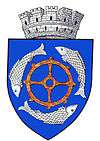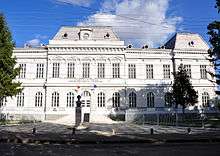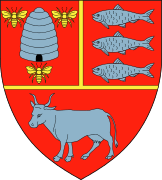Bârlad
| Bârlad | ||
|---|---|---|
| Municipality | ||
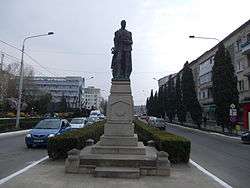 Statue of Alexandru Ioan Cuza, downtown Bârlad | ||
| ||
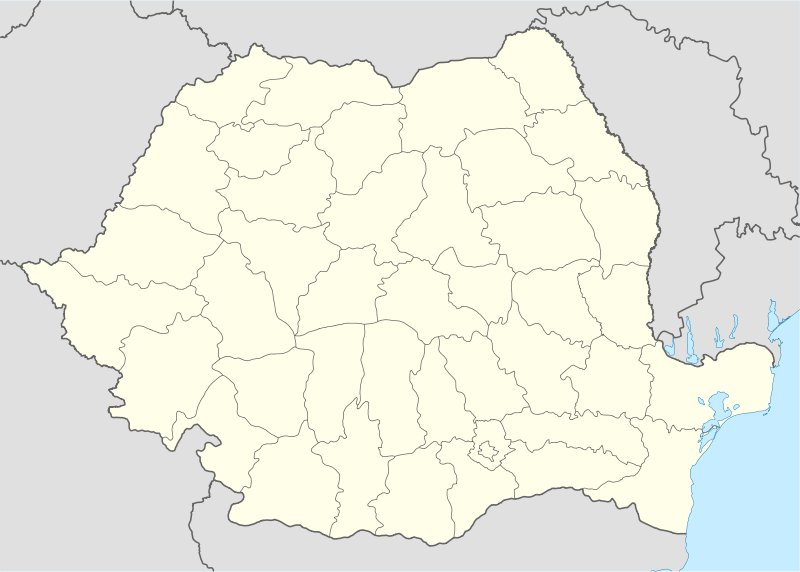 Bârlad Location of Bârlad | ||
| Coordinates: 46°13′N 27°40′E / 46.217°N 27.667°ECoordinates: 46°13′N 27°40′E / 46.217°N 27.667°E | ||
| Country |
| |
| County | Vaslui County | |
| Status | Municipality | |
| Government | ||
| • Mayor | Dumitru Boroș (National Liberal Party) | |
| Area | ||
| • Municipality | 15 km2 (6 sq mi) | |
| • Metro | 20 km2 (8 sq mi) | |
| Population (2011)[1] | ||
| • Municipality | 55,837 | |
| Time zone | UTC+2 (EET) | |
| • Summer (DST) | UTC+3 (EEST) | |
| Climate | Cfb | |
| Website |
www | |
Bârlad (Romanian pronunciation: [bɨrˈlad] (![]()
At Bârlad the railway from Iași diverges, one branch skirting the river Siret, the other skirting the Prut; both reunite at Galați. Along with a maze of narrow and winding streets, Bârlad features several notable modern buildings, including the hospital administered by the Saint Spiridion Foundation of Iași. In the vicinity of the city are ruins of a Roman camp.
The city is the birthplace of Romanian Domnitor (Ruler) and diplomat Alexandru Ioan Cuza.
Etymology
Scholars continue to debate the origin of the city's name. The Hypatian Codex mentions a market town called Berlad, and some historians, influenced by a document Bogdan Petriceicu Hasdeu published in the 19th century, have tried to link this town and its inhabitants (variously considered Romanians, East Slavs or an amalgam) with the Moldavian Bârlad. Ioan Bogdan demonstrated that the Hasdeu document was false, thus invalidating the hypothesis. Like Siret and Suceava, the medieval town took its name from the adjacent river, but nothing more can be said for certain. Constantin Cihodaru linked the name, of possible Hungarian origin, to a Slavic word (berlo — "rod", "cottage" or birlo — "swamp"), to which was added the Hungarian suffix -d, also found, for example, in the names Cenad, Arad, Tușnad and Tășnad. Supporting this notion is the historic presence of a significant Hungarian community, with traditions recalling the fight against the Tatars in the mid-14th century.[2]
History
During World War II, Bârlad was captured on 24 August 1944 by Soviet troops of the 2nd Ukrainian Front in the course of the Jassy–Kishinev Offensive.
Population
- 1900: 24,484 (of which one-quarter were Jewish)
- 1912: 25,288
- 1930: 26,204
- 1948: 24,035
- 1956: 32,040
- 1966: 41,060
- 1977: 55,937
- 1992: 77,518
- 2002: 69,183
- 2011: 55,837
Natives
- Constantin Aur
- Martin Bercovici
- Mihail Cristodulo Cerchez
- N. D. Cocea
- Adi Cristian Colceru (David Deejay)
- Alexandru Ioan Cuza
- Manolache Costache Epureanu
- Elena Farago
- Leonte Filipescu
- Gheorghe Gheorghiu-Dej
- Max Goldstein
- Marcel Guguianu
- Ernest Juvara
- Valeriu Lazarov
- Alexandru I. Philippide
- Ștefan Procopiu
- Andreea Răducan
- Nicolae Tonitza
- Ovidiu Tonița
Education
Bârlad features a total number of 43 school units, of which 23 kindergartens, 12 primary and secondary schools, 4 high schools, one vocational school, one music and arts school, an orphanage for preschool children and one for school children.
All these units are subordinated to the Romanians Ministry of Education.
The five high schools in Bârlad are Colegiul Național Gheorge Roșca Codreanu (Gheorghe Roșca Codreanu National College) - the only national college in Vaslui County; Liceul Teoretic Mihai Eminescu (Mihai Eminescu Theoretical High School); Grupul Școlar Industrial Alexandru Ioan Cuza (Alexandru Ioan Cuza Industrial High School); Liceul Tehnologic Petru Rareș and Liceul Pedagogic Ioan Popescu (Ioan Popescu Pedagogical High School).
Sport
"Rulmentul Bârlad" is the city's rugby team, currently playing in the first rugby league in Romania. One of the pioneers of rugby in Romania, the first team was created in 1956 under the name of "Constructorul", meaning "The Builder" in Romanian. "S.C. RULMENȚI S.A. Bârlad" was formed later on in 1962, competing in the first tier of the Romanian rugby division ever since. The team colours are white and blue. Notable performances are the winning of the 1986 and 1987 F.R.R cup (Federația Română de Rugby - The Romanian Rugby Cup).
"Fepa '74 Bârlad" was the city's football team, changing its name to "F.C. Bârlad" shortly after. Its best performance was the promotion in the second tier of the Romanian Football Championship in the mid-1980s.
Gallery
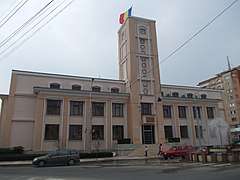 City Hall
City Hall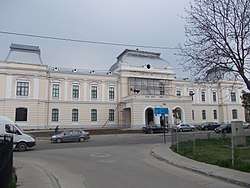 Vasile Pârvan Museum
Vasile Pârvan Museum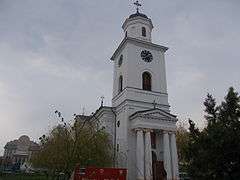 St. Elijah Church
St. Elijah Church_B%C3%A2rlad.jpg) Palace of Justice
Palace of Justice
See also
Notes
- ↑ "Population at 20 October 2011" (in Romanian). INSSE. January 2014. Retrieved 18 June 2016.
- ↑ Laurențiu Rădvan, Orașele din Țările Române în Evul Mediu, p.486-87. Editura Universității "Alexandru Ioan Cuza" din Iași, 2012, ISBN 978-973-703-719-0
External links
| Wikimedia Commons has media related to Bârlad. |
- (in Romanian) Bună Dimineața Bârlad - BDB News
- (in Romanian) Bârlad City Hall site
- (in Romanian) Bârlad city portal
